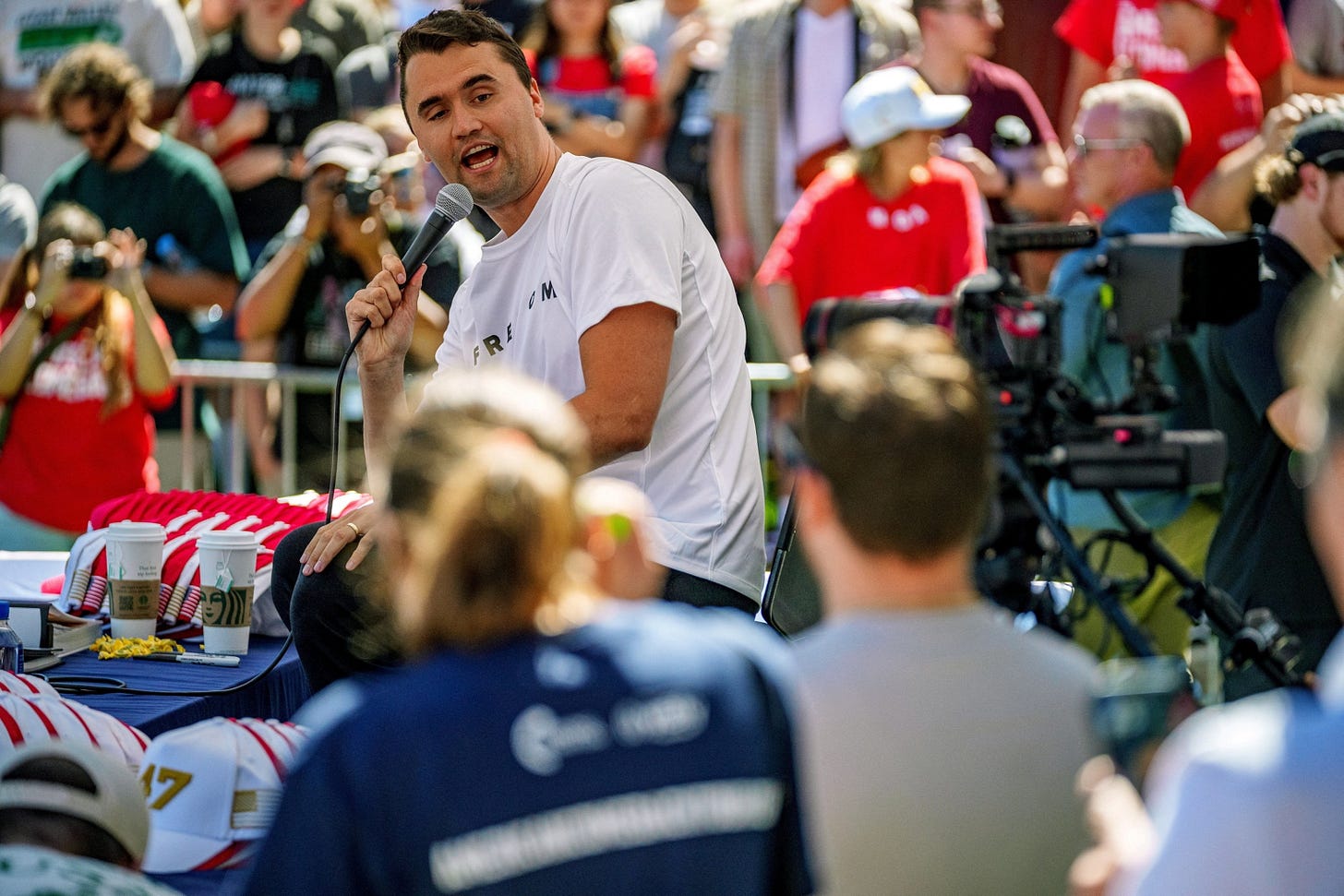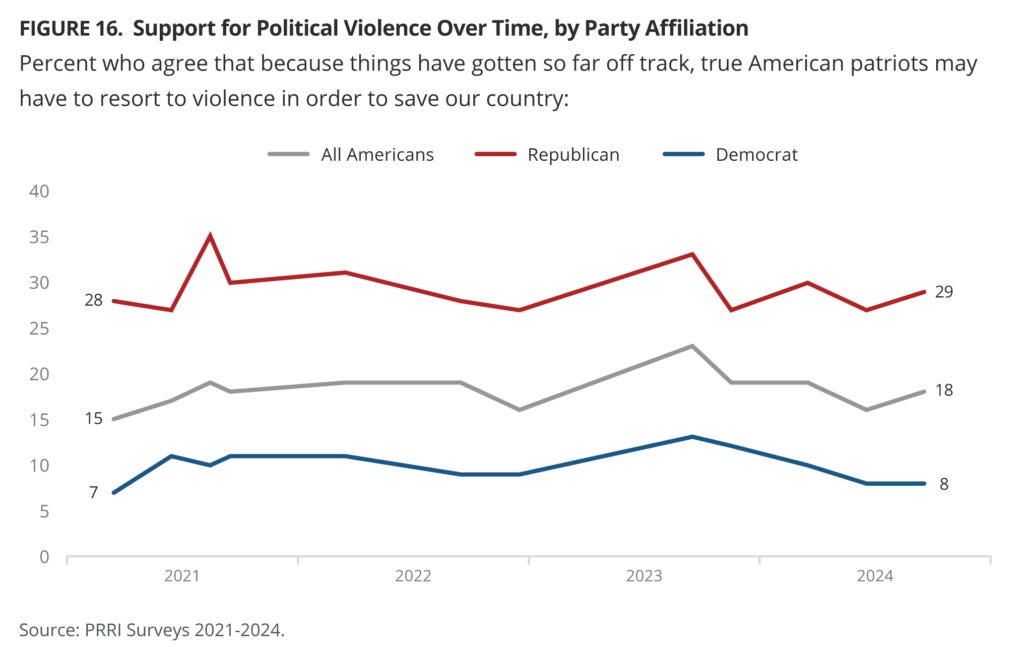Political Violence in the U.S.A.
The alternative to political violence is civility, healthy disagreement, and democracy.

Over one in three college students, 34%, say that the use of violence to stop someone from speaking on campus is acceptable in rare cases, according to a survey by the Foundation for Individual Rights and Expression (FIRE) released Tuesday. The day after the results of that survey were released, Charlie Kirk was shot and killed on a college campus.1
But it's not just college students. Political violence has become acceptable among a growing number of all American adults. In an October 2024 PRRI poll, 18% of Americans agreed that “because things have gotten so far off track, true American patriots may have to resort to violence in order to save our country.” This number peaked in September 2023 at 23% but is higher than March 2021 when it was at 15%.
An increasing number of Americans also believe they don't just have different views than those in the opposing political party, but their political opponents are personally immoral or evil.
Seventy-two percent of Republicans said Democrats are immoral in a 2022 Pew Research Center survey, which was a 25 percentage point increase since 2016. Similarly, 63% of Democrats described Republicans as immoral in same survey, an 18 percentage point increase since 2016.
In a 2024 survey conducted by SNF Agora/YouGov, nearly half of the electorate said their opponents are "not just wrong" but "downright evil."
A January 2024 report by the Brennan Center for Justice found, “More than 40 percent of state legislators experienced threats or attacks within the past three years, and more than 18 percent of local officeholders experienced threats or attacks within the past year and a half. The numbers balloon to 89 percent of state legislators and 52 percent of local officeholders when less severe forms of abuse — insults or harassment such as stalking — are included.”
Those who engage in political violence have given up on the tools of democracy to achieve their political goals. An April Tufts University survey of 18-29 year olds found that 31% of Gen Z “do not buy into the value of democracy, have little confidence that the system works, and show higher support for authoritarian governments than other youth.” A March 2024 AP poll found that 8% of U.S. adults believe democracy is “not a good system” and 14% believe the U.S. is not a democracy.
The warning signs were there. The preconditions for political violence existed as we’ve witnessed just this year the assassination of Minnesota state Rep. Melissa Hortman, attempted assassination of Minnesota state Sen. John Hoffman, an arson attack on the home of Pennsylvania Gov. Josh Shapiro, the murder of two Israeli embassy staffers in DC, the firebombing of a pro-Israel demonstration in Colorado, a shooting a the Centers for Disease Control and Prevention where one police officer was killed, and now the murder of Charlie Kirk.
In a Friday press conference, Utah Gov. Spencer Cox asked the question that I think many of us are asking, “Is this the end of a dark chapter in our history, or the beginning of a darker chapter in our history?”
The answer is not pre-determined. It depends on what we do next. You may feel frustrated, overwhelmed, and helpless. Indeed, alone, there is little you can do. But you are not alone. At AVC, we're witnessing a growing community of Americans willing to work together, across our differences, to meet these challenges. Seek out these communities where you live, and as always, let us know how we can help.
Reading Suggestions on Charlie Kirk Assassination
Jonah Goldberg: “There Is No ‘They.’ Only ‘We.’: Only one person shot Charlie Kirk. But we are all responsible for the state of our country.”
I get that few people fail to condemn outright murder, but this point applies to more than murder. Perhaps the dumbest and most sinister idea to gain traction in the last few decades is the idea that speech can be violence but violence can be speech. I’m willing to stipulate that the proponents of this claim are correct on the neuroscience insofar that it’s true that “words hurt.” That’s a good argument for condemning ugly, cruel, or bigoted speech. It’s a terrible argument for claiming that speech is “violence.” Why? Because speech isn’t violence.
In the U.K. we now have cases where speech about violence is punished more severely than actual violence. FIRE reports that in the last five years, support among college students for using violence to stop speech has grown nearly 80 percent, from 1 in 5 (already insanely high) to 1 in 3. Attitudes among younger Americans about celebrating the deaths of political figures aren’t great either.
It’s not much of an exaggeration to say that the whole point of politics generally, and constitutional liberal democracy in particular, is to rule out the use of violence to settle disagreements about ideas.
This assassination was awful, evil, and utterly indefensible, but if any good could possibly come out of it, it would be that people actually took to heart Charlie Kirk’s oft-quoted observation that, “When people stop talking, that’s when you get violence.” When people stop talking, “that’s when civil war happens, because you start to think the other side is so evil and they lose their humanity.”
Karen Swallow Prior: “Charlie Kirk didn't die for his culture war views. He died for free speech.”
Freedom of speech is a form of life and governance, a way of living in a society that is not dependent upon the content — a how, not a what. Kirk employed his free speech unapologetically in the cause of the ongoing culture wars and just as unapologetically on behalf of the MAGA cause. Thus, I can disagree and disagree vehemently with many of Charlie Kirk’s views on church and state, on race relations, on vaccinations, election security, cash grabs and more, but strongly affirm his commitment to free speech and the open exchange of ideas and to modeling that commitment so consistently and so long. (I’m very glad he didn’t back off calling for transparency on the Epstein files.)
The suspect, Tyler Robinson, was previously a student at Utah State University, the site of the shooting, but dropped out after one semester in 2021.










